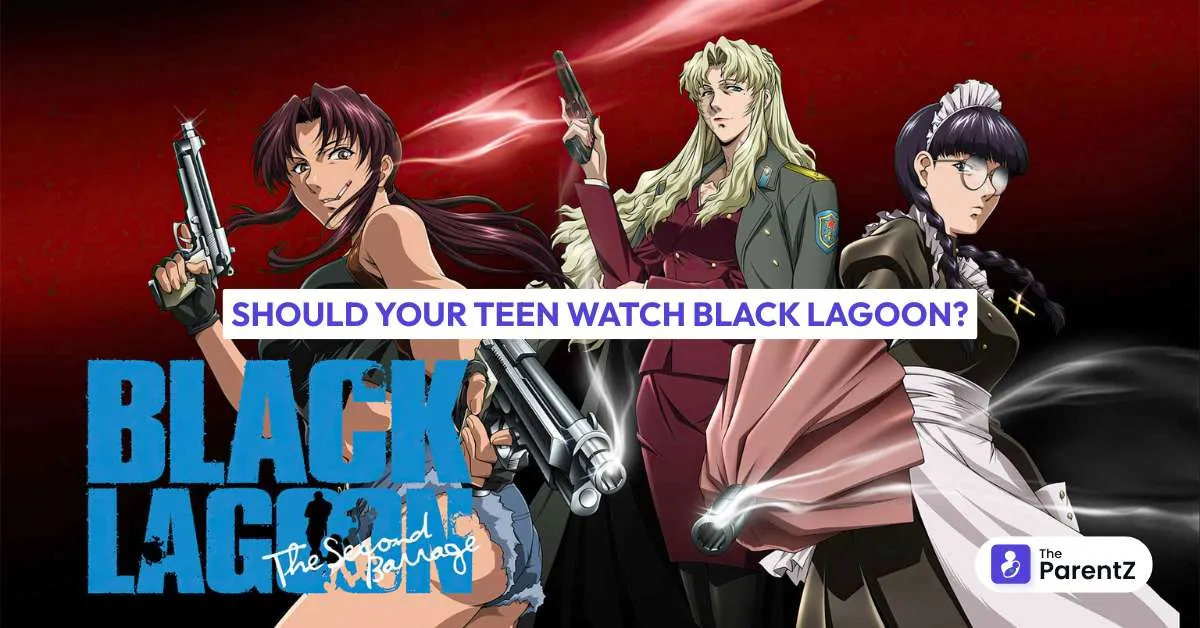Introduction
Black Lagoon isn’t your typical action anime—it’s sharp, fast, and explosively cinematic. But under all the gunfights, boat chases, and bullets is a disturbing yet thought-provoking reflection on morality, trauma, and survival.
It drops viewers into a lawless world where right and wrong don’t just blur—they vanish. And for teens who are still building their sense of self, justice, and emotional resilience, Black Lagoon is a series that demands thoughtful conversation before (and after) they watch it.
Overview
The series begins when Rokuro Okajima, a quiet Japanese businessman, is kidnapped by a mercenary crew in the South China Sea. When his company abandons him, he makes a shocking decision: he joins his captors and becomes “Rock,” a reluctant member of the Black Lagoon transport crew.
Their home base is Roanapur, a fictional city crawling with gangsters, corrupt officials, and hired killers. It’s a world where everyone’s armed, and nobody’s clean.
Each arc introduces Rock—and the viewer—to new layers of global crime: drug cartels, arms dealers, ex-child soldiers, even washed-up revolutionaries. But this isn’t just about crime. It’s about what happens to people when the system they believed in fails them—and the only rules left are survival and profit.
Themes
1. Violence and Moral Decay
Black Lagoon is brutal. Gun battles erupt frequently. Innocents die. Characters—including women and children—are victims of war, trafficking, and exploitation. But it never glamorizes violence. It’s messy, cruel, and, at times, meaningless. That’s the point. The show challenges viewers to think about what violence does to a person—not just physically, but mentally and morally.
2. Identity Crisis and Emotional Dissonance
Rock serves as the viewer’s lens. At first, he’s horrified by Roanapur. But as the show progresses, he changes. He becomes sharper, colder—more manipulative. Revy, his partner (a foul-mouthed, gun-slinging woman with a tragic past), reflects what happens when someone fully embraces that darkness.
The dynamic between Rock and Revy is electric—but unsettling. It forces viewers to question: Is survival worth becoming someone you never wanted to be?
3. Gray Zones of Justice
There are no heroes in Black Lagoon. Only survivors. Each character, even the “villains,” has a backstory—a reason for how they ended up this way. The show explores how trauma, betrayal, and lost ideals twist people into something darker.
For teens used to stories where the good guys win, this shift can feel shocking—or disorienting.
Age Preference
Recommended for: 17+
The show contains strong language, graphic violence, frequent depictions of death, and themes related to human trafficking, war, and abuse. While some older teens may be drawn to its action, they need the emotional maturity to unpack its deeper commentary.
Who Should Not Watch
- Teens under 17
- Viewers sensitive to violence, trauma, or scenes of abuse
- Anyone expecting justice or redemption arcs
- Parents looking for empowering or uplifting media
This series doesn't resolve neatly. It reflects real-life complexity, which is exactly why it's powerful—and dangerous in the wrong emotional hands.
Lessons From It
Despite the chaos, Black Lagoon has value. It explores what it means to lose faith in the system. It shows how people adapt when they’ve been failed by everything—from government to family. It also raises important questions about complicity: When do you stop being an observer and become part of the problem?
For emotionally mature teens, it’s a rare look into the psychology of violence and survival—not glamorized, but exposed.
And in Revy’s character, there’s an unspoken lesson about what happens when no one helps. When pain festers instead of heals. When anger becomes identity.
Conclusion
Black Lagoon isn’t just violent—it’s emotionally violent. It takes you to the edge of morality and forces you to look down. It’s not meant to comfort. It’s meant to unsettle. And for teens ready to grapple with that complexity—with support—it can be unforgettable.
But without context? It risks becoming just another shoot-'em-up show—one where the trauma gets missed, and the numbness takes over.
So if your teen wants to watch, don’t just say yes or no. Sit down. Ask why. Offer to watch with them. Because this isn’t a show you finish and forget. It’s one that lingers—and sometimes, that’s when the real conversation begins.





Be the first one to comment on this story.